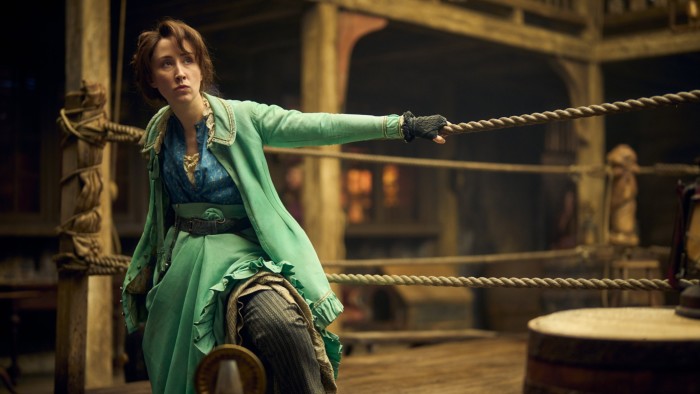Summarize this content to 2000 words in 6 paragraphs in Arabic Anyone writing stories set in Victorian London must reckon with its greatest chronicler: Charles Dickens. British screenwriter Steven Knight has been shadowboxing with the novelist for years. In 2019 he crafted a gritty, well-received Christmas Carol starring Guy Pearce; in 2023, he followed it with a contentious reimagining of Great Expectations with Olivia Colman, both for the BBC (and FX in the US). Now comes pugilistic drama A Thousand Blows for Disney+ and Hulu, set in London’s East End in 1880 and tapping into familiar Dickensian preoccupations of class, violence and outsiders wanting in. Rather than literature, however, it is based on fact: the three main characters really existed. “[I took] what they did from their very sketchy factual histories, then creating who they were from that,” says Knight, who previously scored an international hit with another historical crime series, the Birmingham-set Peaky Blinders.A Thousand Blows stars Stephen Graham as Sugar Goodson, kingpin of London’s bare-knuckle boxing scene, who refuses to sell out and allow gloves to gain respectability. Malachi Kirby plays Hezekiah Moscow, fresh off the boat from Jamaica and destined to challenge Goodson’s supremacy in the ring, while Erin Doherty is Mary Carr, leader of the all-female criminal gang the Forty Elephants, carving out a path between them.“The crux of this show is survival,” says Doherty. “That’s as relevant as it has ever been, but back then the stakes were so high and conditions so poor that if you went to prison, you would die. Mary, Sugar and Hezekiah were literally fighting for their lives. We’re holding up a mirror and asking: how far have we really come? Are we going backwards? They can’t afford to look back, they just have to keep looking ahead, and that’s a quality everyone can learn from.”A Thousand Blows’ version of Victorian London makes a refreshing change from a view usually filtered through existing novels, whether mysteries (Sherlock Holmes, The Irregulars), melodramas (The Crimson Petal and the White, Tipping the Velvet) or Dickens and his contemporaries. Crime thriller Ripper Street and Gothic anthology Penny Dreadful were rare exceptions, while Pre-Raphaelite romp Desperate Romantics sank fast. All three launched more than a decade ago. Yes, class is my thing. I hope this gets a conversation going about itI ask Knight whether adaptations are simply easier to sell. “It depends on the original material,” he says. “If people think it’s time to do another adaptation of something, that works in its favour. With Dickens, it’s generally about working class and upper class, because that’s what it was. His genius was in writing about class without having Marx and Engels to back it up. That’s sort of what A Thousand Blows is about too, but it’s also about the way people lived with each other and got along.”This is a bracing and perhaps unexpected aspect of the series: in a TV landscape preoccupied with gender, ethnicity, sexuality and the associated culture wars, it is class that steers these characters. This focus on reinvention and outsiderdom perhaps reflects Knight’s own journey from Birmingham-raised farrier’s son to Oscar-nominated screenwriter. It has often surfaced in his screenplays, from his 2002 film-writing debut Dirty Pretty Things, through Great Expectations and even the 2021 Princess Diana biopic Spencer.“I’m interested in the motivations of someone smart and talented who, in any other circumstance, would rise straight to the top, but can’t because of what they’ve been born into,” he says. “What do they do to get themselves out of it? And yes, class is my thing. I hope this gets a conversation going about it. Politics was about class until about 1984, when the working class were divided among themselves. I think we’re going back to a time when working-class people knew they shared common causes of getting enough to eat and paying the rent, regardless of colour, gender or sexuality.”In preparing for his role, Graham spoke at length to the historian David Olusoga. “One of his big things was that the racism element wasn’t huge,” Graham says. “It was a relatively level playing field, where the first concerns were always: how do we clothe ourselves, how do we feed ourselves, how do we look after each other?”Lest anyone imagine this is a fantastical past, however, there are moments where racism makes itself known pungently, notably when Moscow visits a zoo hoping to train as a lion tamer. Instead he is offered a large sum of money to become the “Wild Man of Africa”.“This really happened,” Knight says. “Hezekiah would suffer with racism — but he would also not. These two things are happening at the same time, and that’s what’s so complex and great about reality rather than drama. It’s a moment where Hezekiah is told by one person where he ‘truly’ belongs, when his experiences to that point have been very different.”As a Londoner, Kirby saw truth in the series. “It’s one of the rare times where I feel like I’ve seen my own city as I know it to be on screen, even if it was a long time ago,” he says. “In terms of community, vibrancy, this melting pot of ideas, these different countries bringing something to a community? That’s the London that I know.”Knight agrees that the capital as portrayed in A Thousand Blows remains recognisable and relevant. “London is more forgiving than it was, but people arriving illegally are probably living a life similar to Dickensian London. If you’re off the grid, you survive however you can. And that London is still there. Soho during the day is cultural and foodie and all that, but at 4am it’s the Wild West.”Violence — the threat of it, the use of it and the aftermath — has long been another Knight preoccupation, one he will surely return to in the upcoming Peaky Blinders spin-off film The Immortal Man, also featuring Graham.“That’s just the way the world was,” he says. “There was a relationship with combat at the time in England, where you’d leave school, join the army and go and kill people. I was trying to capture that hardness without suggesting that they were monsters, because they weren’t. They were decent people who just liked to fight, but they also helped each other. People will help each other if they can — and kill each other if they have to. What matters is what you have in common, and I hope that’s as true today as it was then.”‘A Thousand Blows’ is on Disney+ in the UK and Hulu in the US from February 21Find out about our latest stories first — follow FT Weekend on Instagram and X, and sign up to receive the FT Weekend newsletter every Saturday morning
رائح الآن
rewrite this title in Arabic A Thousand Blows — Steven Knight on his Victorian bare-knuckle fighting series
مال واعمال
مواضيع رائجة
النشرة البريدية
اشترك للحصول على اخر الأخبار لحظة بلحظة الى بريدك الإلكتروني.
© 2026 جلوب تايم لاين. جميع الحقوق محفوظة.









